In today’s fast-paced world, parenting often involves juggling multiple responsibilities—from work and errands to outdoor adventures and family time. For many active parents, especially those living in rural areas or leading an outdoor-centric lifestyle, traditional strollers can feel limiting when it comes to navigating rugged terrain, transporting children over long distances, or managing heavy gear alongside childcare. Enter the innovative concept of pickup truck strollers , a practical and clever solution that blends mobility, utility, and convenience.
This article explores how pickup truck strollers have emerged as a smart alternative for modern, active parents who refuse to slow down just because they’ve become caregivers. We’ll delve into the origins of this idea, its growing popularity among families with active lifestyles, and how it aligns with the evolving needs of parents who value independence, exploration, and efficiency.
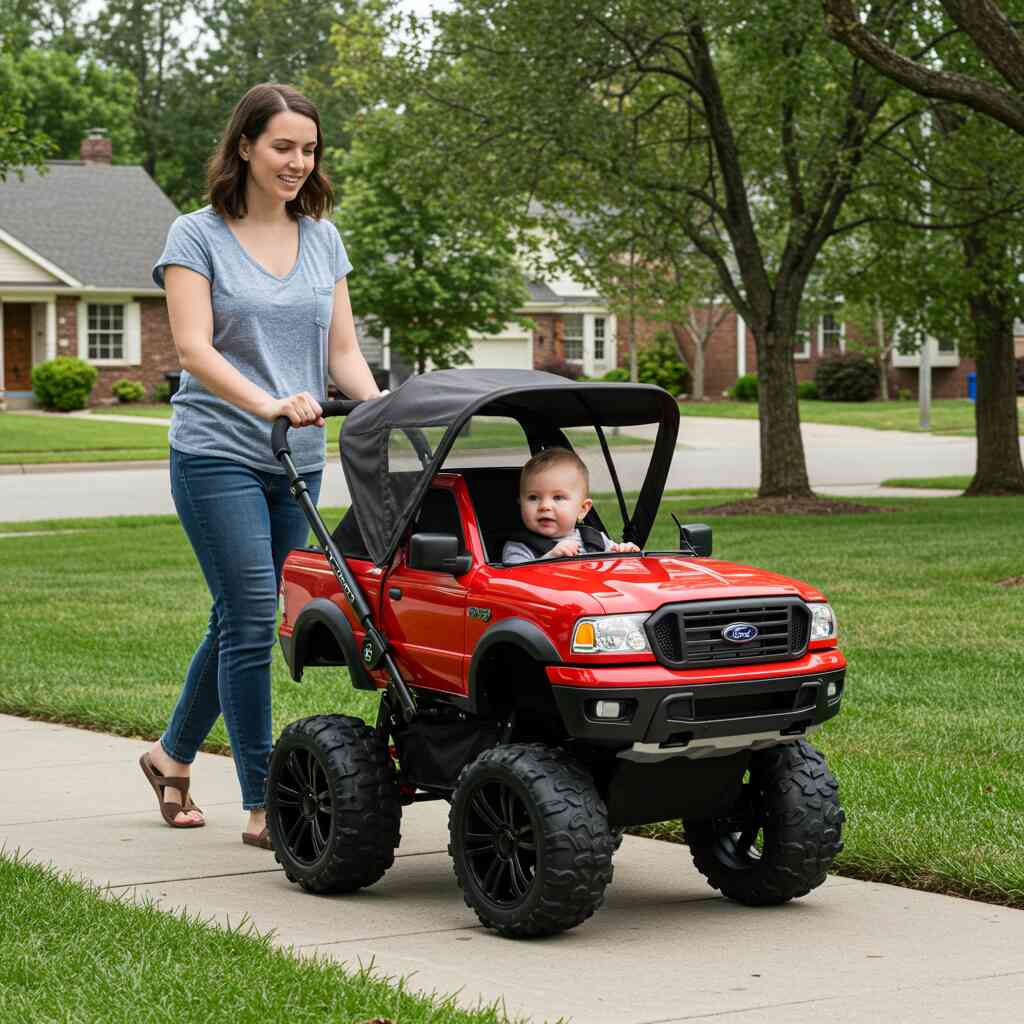
Understanding Pickup Truck Strollers
At first glance, the term “pickup truck stroller” might sound unusual or even contradictory. After all, a stroller is traditionally associated with lightweight frames and maneuverable wheels designed for sidewalks and indoor spaces, while a pickup truck is a rugged vehicle built for hauling cargo and tackling rough roads. However, the concept behind pickup truck strollers isn’t about merging these two items literally, but rather about reimagining how parents can use their vehicles as extensions of their parenting tools.
A pickup truck stroller refers to any system, attachment, or adaptation that allows parents to safely and comfortably transport their child within the bed or cab of a pickup truck. This can include custom-built child seats, convertible platforms, or modular stroller attachments that are designed to fit securely inside or onto the vehicle. These systems are not meant to replace traditional strollers but to complement them—offering an additional option for parents who frequently travel in trucks, whether for work, recreation, or daily commuting.
The core idea is simple: instead of struggling to fold and carry a bulky stroller every time you need to load your child into the vehicle, why not integrate the transportation method directly into the design of your truck? By doing so, parents can save space, reduce physical strain, and streamline their routine without compromising on safety or comfort.
The Lifestyle Behind the Need
To truly understand the appeal of pickup truck strollers, it’s important to consider the lifestyle and environment in which they thrive. Many parents who opt for this type of solution live in rural communities, own small businesses, or engage in frequent outdoor activities such as camping, hunting, farming, or construction. These individuals often rely heavily on their pickup trucks for both work and personal life, making it a central part of their daily routine.
For these parents, a traditional stroller may not be the most practical option. Navigating unpaved trails, carrying heavy loads, or transitioning between work sites and home life can make standard strollers cumbersome or inefficient. In contrast, integrating a child-friendly setup into the back of a truck offers a seamless way to keep children safe and engaged while still allowing parents to perform tasks efficiently.
Additionally, many active parents enjoy taking their children along on adventures that go beyond the typical park visit. Whether it’s a weekend camping trip, a job site visit, or a tailgate event at a sporting match, having a reliable way to transport and care for their child in the context of their mobile lifestyle becomes essential. Pickup truck strollers provide a versatile solution that adapts to a wide variety of environments and situations.
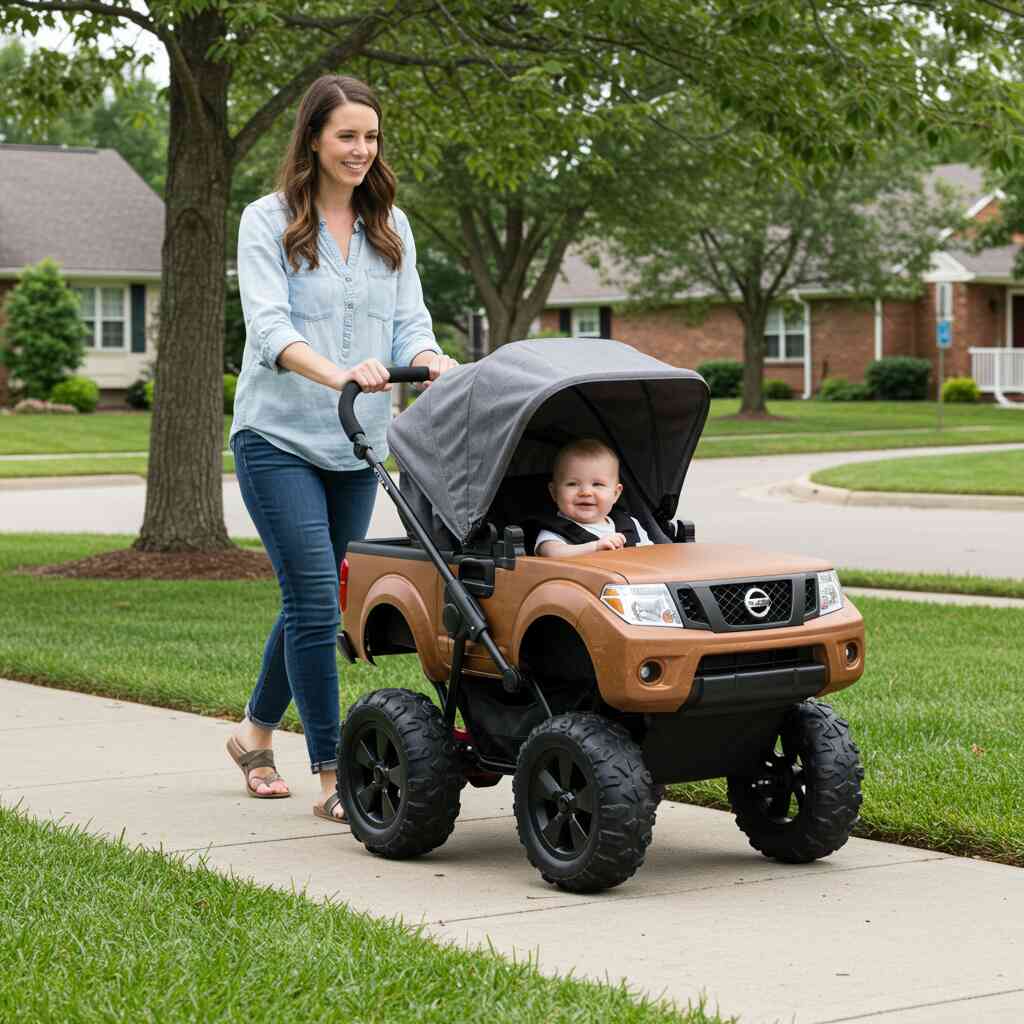
Design and Safety Considerations
One of the most critical aspects of pickup truck strollers is ensuring that they meet high standards of safety and comfort. Unlike conventional strollers, which are designed to operate independently on various surfaces, pickup truck adaptations must account for movement, vibration, and exposure to the elements. Therefore, the design process involves careful consideration of materials, structural integrity, and secure attachment mechanisms.
Many pickup truck stroller systems incorporate features such as:
- Weather-resistant covers to protect against sun, wind, and light rain.
- Shock-absorbing bases to minimize discomfort from uneven terrain.
- Reinforced harnesses or seatbelts to ensure the child remains secure during transit.
- Modular components that allow for easy installation and removal based on the situation.
These features help maintain a balance between functionality and safety, giving parents peace of mind while using their trucks as mobile parenting stations. It’s also worth noting that many of these systems are designed with input from child safety experts and engineers to ensure compliance with general safety guidelines, even though they may not fall under the same regulatory categories as car seats or traditional strollers.
Another key factor in the design philosophy is adaptability. Since no two families have the exact same needs, pickup truck stroller solutions often emphasize customization. Some parents may prefer a more permanent setup, while others might want a detachable unit that can be used both in the truck and as a standalone stroller. This flexibility makes the concept accessible to a broader audience and encourages innovation in design and usage.
Enhancing Family Bonding and Independence
Beyond the practical benefits, pickup truck strollers also play a significant role in enhancing family bonding and promoting independence. By enabling parents to bring their children along on daily tasks and adventures, these systems help foster a sense of inclusion and shared experience. Children grow up witnessing the rhythm of their parents’ lives, learning valuable lessons about responsibility, resilience, and resourcefulness.
Moreover, for parents who might otherwise feel isolated or restricted by the demands of childcare, pickup truck strollers offer a way to maintain autonomy without sacrificing quality time with their children. Instead of being confined to the house or limited to specific outings, they can continue engaging in their usual routines while keeping their little ones close by.
This dynamic is particularly beneficial in households where one parent works remotely or runs a home-based business. Having a child-friendly space within the truck allows parents to run errands, manage deliveries, or conduct fieldwork without needing additional childcare arrangements. It’s a win-win scenario that supports both productivity and parental presence.

Environmental and Practical Benefits
From an environmental standpoint, pickup truck strollers also contribute to reducing clutter and unnecessary consumption. Traditional strollers can take up considerable storage space and often end up unused after a short period. In contrast, integrating child transportation into an existing vehicle minimizes the need for extra equipment, promoting a more streamlined and sustainable approach to parenting.
Furthermore, the practicality of pickup truck strollers extends to their maintenance and durability. Trucks are generally built to withstand wear and tear, and any modifications made for child transportation are typically constructed from robust materials designed to endure harsh conditions. This longevity ensures that the system remains functional across multiple stages of childhood, adapting as the child grows and develops new needs.
Integration with Outdoor Adventures and Family Routines
For many active parents, especially those who enjoy an outdoor-oriented lifestyle, the ability to include children in daily adventures is not just a luxury—it’s a necessity. Whether it’s running errands across town, heading out to a construction site, or exploring nature trails during weekends, these families rely on solutions that allow them to keep moving without compromising their child’s comfort or safety.
Pickup truck strollers offer a seamless way to integrate childcare into these routines. Unlike traditional strollers, which are often limited by terrain and space constraints, pickup truck adaptations can be tailored to support a wide variety of environments—from dusty job sites to muddy campgrounds. This makes them particularly valuable for parents who don’t want to pause their active lives simply because they have young children.
Let’s explore how pickup truck strollers help facilitate different types of family activities and routines:
1. Camping and Nature Exploration
Camping trips are a favorite among families who enjoy the outdoors, but transporting gear and managing small children at the same time can be challenging. Pickup trucks are ideal vehicles for hauling camping supplies, and when equipped with a child-friendly setup in the bed or back seat, they become even more functional.
A pickup truck stroller system can serve as a secure and shaded area where children can rest, play, or nap while parents set up tents, gather firewood, or cook meals. Some models even feature removable platforms that can be used as portable playpens or lounging pads once the vehicle has reached its destination.
Moreover, the elevated position of the child within the truck bed allows them to observe the surroundings safely, making the experience educational and engaging. Children can watch wildlife, enjoy scenic views, or participate in simple tasks like sorting gear—fostering early curiosity and independence.
2. Rural Living and Farm Work
In rural communities, many parents work on farms, ranches, or other land-based operations that require frequent travel between fields, barns, and storage areas. For these individuals, having a reliable way to bring children along without disrupting workflow is essential.
Pickup truck strollers enable parents to transport their children safely from one location to another while still being able to perform hands-on tasks. Whether it’s checking crops, feeding animals, or repairing equipment, the presence of a secure and comfortable child zone within the truck allows parents to remain productive without constantly worrying about their child’s whereabouts.
Additionally, these systems often include features like mesh panels for ventilation, adjustable sunshades, and easy-access points for hydration and snacks—ensuring that children stay comfortable throughout the day. The ability to keep kids nearby also encourages learning through observation, as they become familiar with farm routines and responsibilities from an early age.
3. Outdoor Recreation and Sports Events
Active parents often enjoy recreational activities such as hiking, fishing, hunting, or attending sports events like football tailgates. These outings typically involve carrying multiple items—coolers, tools, game-day supplies—and navigating crowded or uneven spaces.
With a pickup truck stroller, parents can efficiently manage all of these needs in one trip. The stroller setup provides a designated spot for the child, freeing up the parent’s hands to carry equipment or engage in activities. In the case of tailgating or outdoor festivals, some systems even come with fold-out tables or seating extensions, allowing the truck bed to double as a mini-family lounge.
This level of integration enhances the overall experience for both parents and children. It ensures that no one misses out on the fun and that the entire family can participate in shared traditions and hobbies together.
4. Daily Errands and Commuting
Not all uses of pickup truck strollers are limited to weekend adventures. Many parents use their trucks for daily commuting, grocery shopping, school drop-offs, or visiting relatives. In these cases, the convenience of a built-in stroller system becomes apparent.
Instead of folding and unfolding a traditional stroller each time you stop, pickup truck strollers offer a ready-to-use solution that eliminates extra steps and physical strain. They’re especially useful in busy urban environments where parking may be tight and walking distances long.
Some parents appreciate the added benefit of keeping their child off the ground in places like gas stations, hardware stores, or outdoor markets where cleanliness and safety are concerns. By maintaining a consistent, secure space for the child within the vehicle, parents can focus more on their tasks and less on managing equipment or supervising from a distance.
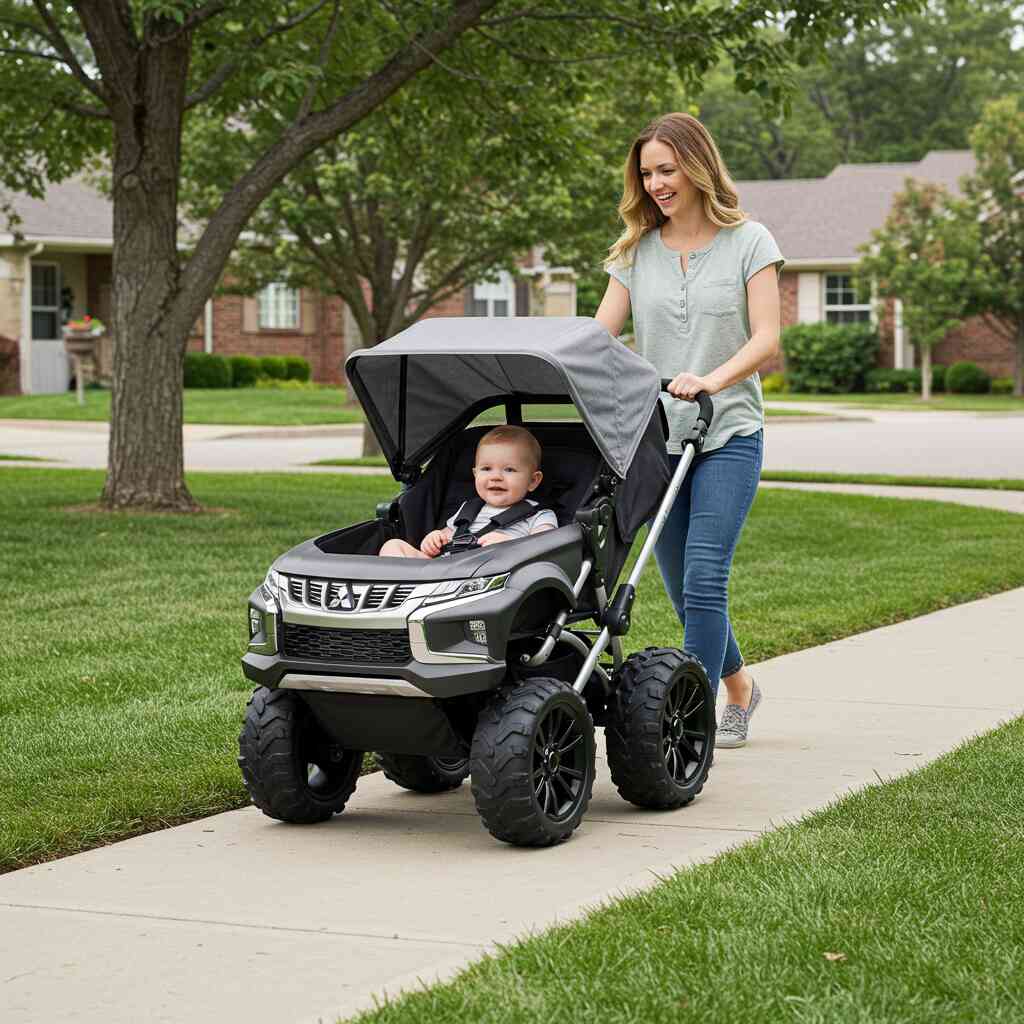
Supporting Different Ages and Developmental Stages
One of the most compelling advantages of pickup truck strollers is their adaptability across various stages of childhood development. From infancy through early childhood, these systems can be modified to meet evolving needs, ensuring that they remain a practical investment over time.
Infancy and Toddler Years
During the earliest years, safety and comfort are paramount. Pickup truck stroller systems designed for infants often include padded reclining surfaces, harness systems similar to car seats, and protective covers to shield against wind and sun. These setups provide a stable environment for napping, feeding, or simply observing the world while on the move.
Parents can also integrate infant carriers or car seats into the system, creating a hybrid approach that combines mobility with familiarity. This flexibility allows caregivers to transition smoothly between driving and walking modes without disturbing the child.
Preschool and Early Childhood
As children grow older and become more curious, pickup truck strollers can evolve to accommodate their changing behaviors. Features such as interactive toy bars, reading pockets, and storage compartments encourage engagement and entertainment during rides.
At this stage, children may also begin participating in tasks like organizing tools, identifying plants or animals, or helping with minor chores. Having a dedicated space within the truck gives them a sense of ownership and involvement, promoting confidence and responsibility.
Some systems even allow for standing or kneeling positions, giving kids the freedom to explore their surroundings while remaining within a safe boundary. This helps satisfy their natural desire to move and interact without compromising parental oversight.
Customization and Personalization Options
No two families are exactly alike, and pickup truck strollers reflect this diversity through a wide range of customization options. From modular attachments to fully integrated systems, parents can choose configurations that best suit their specific needs and preferences.
Modular Attachments
Many pickup truck stroller systems are designed to be modular, meaning they can be easily installed or removed depending on the situation. This is especially useful for parents who use their trucks for multiple purposes beyond childcare—such as hauling cargo, towing trailers, or transporting pets.
Modular units often come with quick-release mechanisms or universal mounting brackets, allowing for fast transitions between different configurations. Some parents opt to have multiple setups—one for daily use and another for weekend adventures—so they can switch as needed without hassle.
Integrated Systems
For those who prefer a more permanent solution, integrated systems offer a built-in experience that feels like a natural extension of the truck itself. These setups are often custom-designed to match the make and model of the vehicle, providing a sleek and cohesive look.
Integrated systems may include features such as retractable canopies, insulated compartments for food or drinks, and even electrical outlets for charging devices. While more involved in terms of installation, these systems offer unparalleled convenience and durability, especially for families who use them regularly.
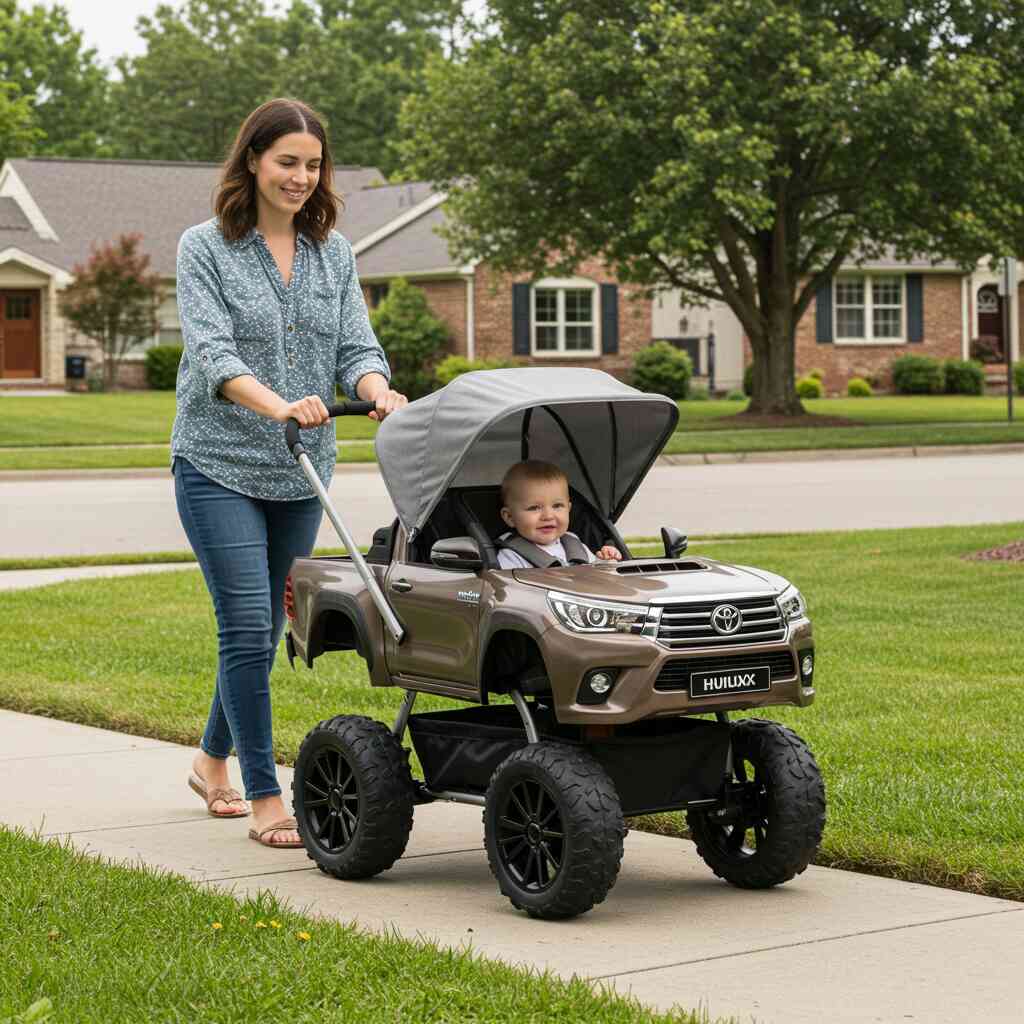
DIY and Homemade Solutions
There’s also a growing community of parents who create their own pickup truck stroller setups using DIY methods. These homemade versions might include repurposed materials like foam padding, weatherproof fabric, or recycled plastic components.
While DIY builds vary widely in complexity and design, they often emphasize creativity, cost-effectiveness, and personalization. Some parents enjoy involving their children in the building process, turning it into a bonding project that teaches skills like problem-solving, craftsmanship, and teamwork.
Regardless of whether a system is store-bought or homemade, the key is ensuring that it meets basic safety standards and offers comfort for the child. As long as these elements are addressed, the possibilities for customization are nearly endless.
Building a Community Around Mobile Parenting
As the concept of pickup truck strollers continues to gain traction, it’s fostering a growing community of like-minded parents who share ideas, experiences, and innovations. Online forums, social media groups, and local meetups have emerged as spaces where families exchange tips on adapting their trucks, showcase creative designs, and support one another in balancing parenthood with an active lifestyle.
This sense of community plays a vital role in normalizing alternative parenting solutions and encouraging innovation. It also helps reduce feelings of isolation that some parents may experience when their lifestyle differs from mainstream expectations. By connecting with others who face similar challenges, parents gain access to a wealth of knowledge and inspiration that can enhance their own experiences.
Workshops and collaborative projects have also begun popping up in some regions, where parents come together to build or upgrade their pickup truck stroller systems under the guidance of experienced designers or engineers. These gatherings not only promote skill-sharing but also reinforce the idea that parenting doesn’t have to conform to rigid norms—it can be as flexible, adventurous, and resourceful as the families themselves.
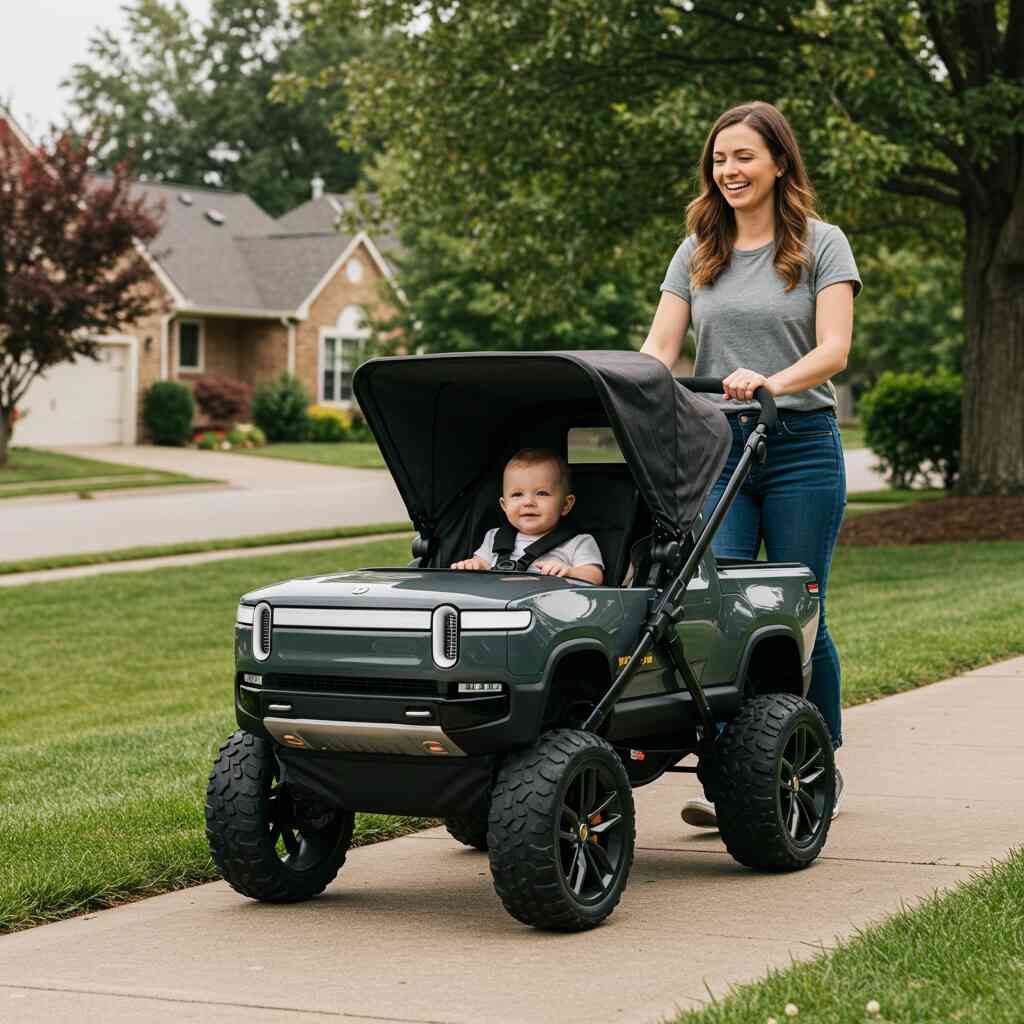
Conclusion: Embracing Innovation in Modern Parenting
In conclusion, pickup truck strollers represent a forward-thinking approach to meeting the diverse needs of today’s active parents. They are not merely a convenience item but a reflection of how modern families are redefining what it means to raise children in a mobile, multifaceted world. By combining the strength and versatility of pickup trucks with thoughtful, child-centered design, these systems empower parents to navigate their daily lives with greater ease and confidence.
Whether you’re a working parent who uses your truck for daily commutes, a weekend adventurer seeking new trails, or someone who values practicality above all else, pickup truck strollers offer a compelling solution that aligns with your lifestyle. As society continues to evolve and embrace more inclusive, adaptive parenting models, innovations like these will play a crucial role in shaping the future of family life.
Ultimately, the rise of pickup truck strollers underscores a broader shift in how we think about caregiving tools—moving away from rigid, one-size-fits-all products toward customizable, context-sensitive solutions that support real-life challenges. And in doing so, they pave the way for a more integrated, efficient, and joyful parenting experience.